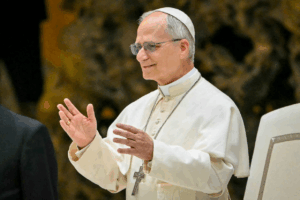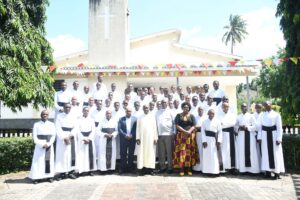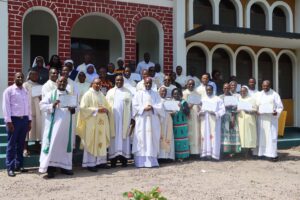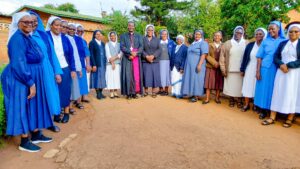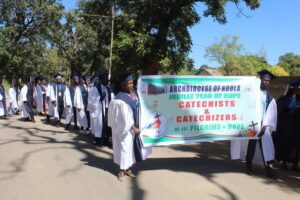CEPACS NIGERIA: CEPACS’ Golden Jubilee, a Turning Point for Reinvigoration, Says Cleric

Fr. Andrew Kaufa AMECEA's Social Communications Coordinator
Sr. Jecinter Antoinette Okoth, FSSA
The Golden Jubilee celebration of the Pan African Episcopal Committee for Social Communications (CEPACS) marked in Lagos, Nigeria, from 18 to 21 November, calls for the renewal and new beginning of the Committee that was established to enhance the use of media for evangelization in Africa, a cleric has said.
When CEPACS was established 50 years ago as an initiative of the Symposium of Episcopal Conferences of Africa and Madagascar (SECAM) in response to the Vatican’s document Communio et Progressio (the pastoral instruction on the means of social communication), the African bishops referenced the Vatican II document noting that “The Church considers media tools as gifts from God. (and) According to the intention of Providence, they must generate between men fraternal relations likely to favor its plan of salvation.”
While addressing delegates from across Africa and beyond including Vatican who attended the two-day celebration in Lagos, Fr. Andrew Kaufa the Social Communications Coordinator for the Association of Member Episcopal Conferences in Eastern Africa (AMECEA) highlighted the need for the continent to learn from the past and forge ahead without repeating past mistakes.
“Both the Synod and the 50th anniversary of CEPACS give us an opportunity to revisit the Pan-African dream regarding Church communication…and relaunch communication at all levels of our Church in Africa,” Fr. Kaufa who also serves as a Consultant in the Vatican’s Dicastery of Communications said during his presentation on Monday, November 20, adding that “the lack or inadequate spaces for continental coordination, leadership, and capacity development is one of the most critical gaps that stands between appropriate application of the traditional/social media and the pastoral challenges in the continent.”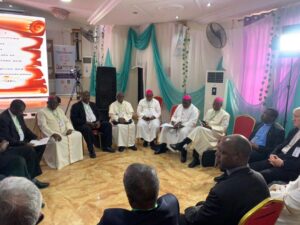
Even though CEPACS marks 50 years of existence, the office of the committee fell vacant for a period of over ten years which made its activities go down before the current President Bishop Emmanuel Adetoyese Badejo of Oyo Diocese, Nigeria was elected in 2015 to revive the interest of the bishops in the continent to once again embrace and promote the use of social communications for evangelization.
“The lack of a strong continental communication structure to witness the conviction of the bishops on the centrality of communication in the mission of the Church is the reason why this assembly is convened in the context of the 50th anniversary of CEPACS, to deliberate on the lost opportunities, search for its future, and spell out the future strategic actions that would facilitate its operations for the next 50 years to come,” Fr. Kaufa said.
As a way forward, the cleric highlighted some key concerns to revitalize the committee saying, “We are looking forward to “a revamped, strengthened, and localized CEPACS with a clear, defined agenda with a context-based goal, vision, and mission shared and driven by the regional bodies and advanced through all the national conferences.”
“The Church in Africa is poised to contribute significantly to the universal Church, by using the media to ‘reach and affect the whole of society of Africa and beyond,” he added.
According to Fr. Kaufa who was part of the organizing team of the Golden Jubilee celebration, SECAM and all its eight regional bodies need to “create opportunities to harness the church efforts in Africa to collectively champion actions of addressing the contemporary and emerging social and pastoral challenges by offering appropriate teachings through the widely used channels.”
Besides, SECAM needs to “create more space for the communicators to advance localized mechanisms of community building around the theme of Synodality, a move which calls for “promoting cooperation in the divine work of creation and conservation,” he underscored and added that however much the vision and task of the committee is clearly defined in CEPACS Pastoral plan of 2003, “the issue around ownership and membership must also be emphasized (and) the national conferences of bishops and regional bodies must take lead and own the infrastructure.”
The 50th Anniversary of CEPACS therefore is to “design the new life of CEPACS, and also envisage to bring together the key leaders and technical persons from the regional bodies and selected national conferences of bishops to participate in, contribute to and take back the CEPACS agenda to respective agencies,” The AMECEA Social Communications Coordinator narrated and concluded, “In line with the agenda that will be set, a follow-up meeting shall soon be organized for the President of CEPACS and key stakeholders to engage further on the agenda and come up with a SMART turnaround strategy.”
